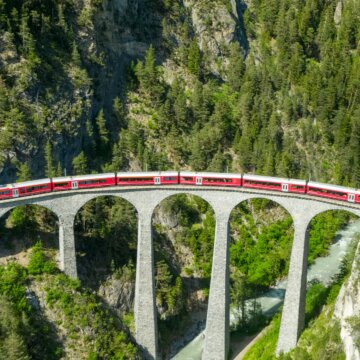- About
- Topics
- Picks
- Audio
- Story
- In-Depth
- Opinion
- News
- Donate
- Signup for our newsletterOur Editors' Best Picks.Send
Read, Debate: Engage.
| topic: | Climate action |
|---|---|
| located: | Switzerland |
| editor: | Abby Klinkenberg |
Austria, which has recently been in the news more for corruption scandals than for green politics, has taken a drastic step in the right direction when it comes to tackling carbon emissions in the transportation sector. On 26 October, the country launched its Klimaticket (“climate ticket”), allowing Austrians to ride public transit anywhere - yes, anywhere - within national borders for the rather shockingly low price of three euros per day.
From Innsbruck to Vienna, from Graz to Salzburg, ticket-holders are free to travel from one corner of the country to the other for less than the price of half-litre of beer.
Upon its release of discounted early-bird tickets on 1st October, the Klimaticket website immediately crashed from an onslaught of traffic from public transit lovers looking to take advantage of the new offering. Over 70,000 have already been sold - 70 percent of the Austrian Ministry of Environment and Transport’s subscription target for the year.
The annual pass costs €1,095, or €21 per week, which evens out to that cool figure of three euros per day. Sadly for tourists, this deal can’t be taken advantage of on a daily or weekly basis; the initiative is firmly geared towards local commuters - and their vehicles.
The main motivation behind offering such low rates is to inspire Austrians to abandon their carbon-emitting cars for the more eco-friendly public transit systems in place across the country. While Austrians are among Europe’s most avid train riders, CNN reported that 84 percent of journeys made in 2018 were made by means other than public transport. The Klimaticket seeks to change that.
Initially proposed 15 years ago, the Klimaticket finally came into being under the pioneering eye of the Green Party’s Minister of Climate Action and Environment Lenore Gewessler, whose purview also extends to transport, energy and technology. This marks the first big win for the Austrian Green Party, which is currently governing in coalition with the liberal-conservative Austrian People’s Party (whose former Chancellor Sebastian Kurz stepped down earlier this month due to a widely publicised corruption scandal).
While the pandemic kept many of the Green Party’s initiatives from coming to fruition, this Klimaticket catapults Austria to the top of the list when it comes to European countries most proactive in tackling carbon emissions in the transportation sector.
This initiative is but one of the Austrian Green Party’s three radical transportation proposals: they also seek to reduce the price of transport between any two Austrian regions to two euros and within any single Austrian region to one euro. The Klimaticket tackles the most far-reaching and ambitious national scope of this so-called 1-2-3 initiative. It remains to be seen whether the “1-2” of this plan will be realised.
To finance the policy, a subsidy of €150 million has been earmarked in the country’s 2022 budget in addition to €96 million this fiscal year. It is likely that this initiative will necessitate capacity upgrades for public transit systems across the country as it brings more people into the climate-conscious fold.
In Germany, Austria’s larger neighbour to the north, the go-anywhere equivalent of the Klimaticket is the Bahncard 100, which is nearly four times as expensive at €4,000 per year. While part of this price disparity can be accounted for in terms of Germany’s significantly larger geography, the additional factor of its extremely strong automotive industry has tended to historically dampen political enthusiasm for public transit. The Environmental Action Germany non-profit, associated with the European Environmental Bureau, is demanding that the new German federal government execute the same Klimaticket policy as Austria.
In addition to Germany, Switzerland and the Netherlands have also started conversations about adopting a version of this initiative in their own transit sectors as they all work towards a greener future. All eyes are on Austria as the world waits to see how significantly the Klimaticket will affect national transit habits and emissions figures. Ultimately, it’s exactly this kind of radical policy that is needed in the fight against climate change - hopefully it will be the first of many like it.
Photo by Peter Wormstetter

